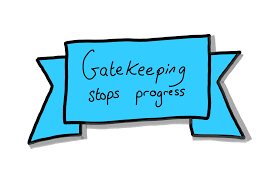Breaking Barriers: The Damage of Gatekeeping and the Power of Collective Growth
- Lalita Dileep

- Jul 22, 2025
- 3 min read

Beyond the Borders
Gatekeeping. It’s a word that gives me pause because, at some point we’ve all felt its sting—whether it’s in a workplace, creative community, academic circle, or even a friend group. Gatekeeping is the subtle (and sometimes not-so-subtle) act of setting up arbitrary barriers. Limiting who can join or contribute, capriciously deciding who is “worthy” of being part of a space and or can have access to information or activity. Often this is masked as protecting quality or criteria, in reality, gatekeeping is restriction, debilitating, cruel even. It prioritizes winning over value. Rather than fostering collaboration, collective growth and accountability, gatekeeping creates divisiveness and erects barriers.
Gatekeeping is selfish, exhibits lack of confidence and creates an environment that withholds access and resources. Passion and curiosity are nipped and stifled. The myth of winning alone is warped. It gets lonely when you reach the top. Those who reach the summit are swathed in isolation finding it desolate and wretched. A lesson learnt much too late sometimes is that true fulfillment comes from contributing to something bigger than ourselves. In aiding others, we become the finer person.
When someone is told, directly or indirectly, that they do not belong or are not good enough by some nebulous standard, it chips away at their self-confidence. Passion and curiosity are stifled in such an environment. Instead of feeling encouraged to learn, experiment, and evolve, people begin to tiptoe, fearing ridicule or rejection for making mistakes or “not knowing enough.” I have been at the receiving end of such treatment. Let’s begin to change the narrative.

Collaboration and Growth
Communities and organizations that break down gatekeeping find themselves more resilient, more innovative, and ultimately more successful. The rising tide really does lift all boats. Gatekeeping turns what should be a learning curve into a brick wall. Anyone on the receiving end internalize a false narrative of scarcity—that very few are “allowed” to succeed. This creates anxiety and discourages risk-taking, a vital fuel for growth. No one develops in a vacuum; progress requires openness, encouragement, and the freedom to ask questions. When we hoard knowledge or opportunities, others are forced to compete for scraps rather than build something greater together.
Perhaps most damaging is that gatekeeping fractures communities. Collaboration relies on trust and a sense of belonging, which gatekeeping undermines. Instead of advancing as a team, we begin eyeing each other with suspicion, prioritizing individual advancement at the expense of shared goals. Innovation slows down because the best ideas often come from diverse experiences and viewpoints. When we restrict who can participate, we miss out on talents and perspectives that could have led to breakthroughs. Creativity is stifled, morale sinks, and folks feel undervalued. Communities loose vibrancy and adaptability. Imagine a world where every person who enters a space is met with support and the assumption that they bring unique value. When we focus on collective growth, everyone has a stake in each other’s success. The standard isn’t how high one person can climb on their own, but how far we can all go together.
We all have a choice: keep the gates locked and the community small, or open them wide and invite collective growth. The first path leads to frustration and stagnation; the second to abundance, connection, and sustained success.
Let’s leave gatekeeping where it belongs—in the past—and focus on bringing each other to new heights. Dear reader, do you agree, that the journey is better, and the victories are sweeter, when none of us are left behind?
We are stronger together




Comments